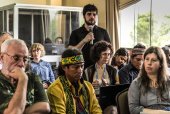Radio Mundo Real
http://radiomundoreal.fm/8090-financialization-and-extractivism
10 de diciembre de 2014 | Noticias | Justicia climática y energía | COP 20 - Lima

Financialization and extractivism: Analysis and experiences around the processes of financialization of nature in Lima
One day before the beginning of the Peoples´ Summit in Lima, parallel to the 20th UN Conference of the Parties on Climate Change, different social organizations and movements co-organized an activity on December 7th focusing on one of the processes that have been taking place in the past years which represents an increasingly larger threat against the rights of the peoples: the so-called financialization of nature and its link with the extractivist economic model.
Organized by the Heirich Böll Foundation, Friends of the Earth Latin America and the Caribbean, the World March of Women, Via Campesina Brazil, the Carta de Belem Group, Jubilee South Americas, ATTAC France, the Transnational Institute and the Trade Union Confederation of the Americas, the activity aimed also at analyzing how the mechanisms for the financialization of nature are entering the territories. With this aim, representatives of Brazilian (Jaminawá and Apolima-Arara) and Ecuadorian (Sarayaku) indigenous communities were present.
The member of the Carta de Belem Group, Maureem Santos, was in charge of presenting the activity. According to her, the logic of financialization of nature is not based on a response to the climate crisis, but a proposal created “by and for capitalism”.
Maureen highlighted the need to “understand this new process of capital accumulation based on a natural capital perspective”. According to her, this process “is now going through another stage through the financialization of nature, and what we are referring to as the commodification of the commons, which are intangible”.
The modifications to give way to the advance of these processes come from different sectors. “There is a homogenization process of national economies; carbon is being transformed into a new macroeconomic variable, and there are institutional-political changes, such as the passing of the new Forestry Code in Brazil, which is an instrument to weaken environmental laws in the country”, said the member of Carta de Belem Group.